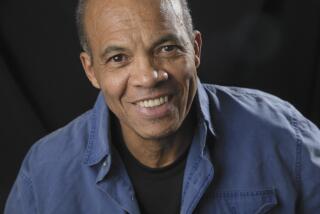You Can’t Drive Home Again : Richard Ford’s “Sportswriter” character changes careers again. Is this growing up or just growing older? : INDEPENDENCE DAY, <i> By Richard Ford (Alfred A. Knopf: $24; 451 pp.)</i>
- Share via
A central dread of Frank Bascombe’s life in Richard Ford’s new novel, “Independence Day,” is that his ex-wife has married an architect. Bascombe is a realtor, someone who by his own description sells dreams. But his ex has left him for somebody who builds them, and somehow manages to bring those dreams to life. The question of what makes a house a home, and a group of people a family, animates Ford’s novel.
Bascombe goes on an air-conditioned drive across New England, in a sense looking for the architect who might animate his own life. It’s a parody of the journey to knowledge--Bascombe is a pilgrim more lost than he knows on his way to the shrine. Bascombe is on an idiot mission over the Independence Day weekend of 1988, driving with his son and trying to hit as many halls of fame as they can in 48 hours. Along the way, he thinks he’ll: save his son from the life of crime he fears is ahead by reading Emerson to him; rendezvous with his girlfriend; and maybe get back together with his wife. His Ford Crown Victoria becomes his secret Mayflower on his voyage into the soul of independence. But instead, Bascombe gets a royal comeuppance, ends up crying three times in less than 24 hours and has to take his son to the emergency room.
“Independence Day” picks up five years after Ford’s celebrated 1986 novel, “The Sportswriter.” Bascombe is still living in Haddam, the New Jersey commuter town where he feels at home in his cheerful invisibility. By having Bascombe end up a sportswriter after a promising start as a fiction writer in the earlier book, Ford hit an ominous bass-chord of failure. (You could have made a drinking game out of how frequently Ford homed in on that chord in the earlier novel--every time somebody asks Frank why he doesn’t write short stories any more, the reader downs a shot. Bascombe himself would have liked that.) And yet Ford here has extended the feat, finding a chord resonating even lower than the last one. Bascombe has quit his unnamed sports magazine and become a real estate agent. And if the intended fall, from man of letters to man of ledgers, is meant to be calamitous, it is also oddly rich with possibility--rarely has real estate seemed so tethered to the very mysteries of life.
Bascombe is knee-deep in what he calls the Existence Period, an epoch lodged between the Pleistocene and the Great Beyond. He is existing but hardly more, shutting out those who get too close, effortlessly mangling the lessons of his life, rotting from the inside out. “When you’re young your opponent is the future,” he offers, “but when you’re not young, your opponent’s the past and all you’ve done in it, and the problem of getting away from it.” Forward to the deep freeze. Where the Bascombe of “The Sportswriter” would at times shriek and squeal over what was slipping away--his wife, youth, self-esteem; he imagined himself translucent, walking the streets of Haddam--now the middle-aged realtor tries to focus on the good he imagines he’s doing setting people up in new homes. Failing that, he concentrates on the fixed mortgage rates. He’s no happier, but he’s resigned to disappearing, and that steadies his voice.
Fumbling his own life choices while fancying he’s helping strangers with theirs, Bascombe himself has only gotten more pathetic in the years since he gave up sportswriting. When his ex-wife moved out of Haddam, Bascombe sold his home, bought hers and moved in. He has an intricate definition of “home” he’s trying to sell himself; by owning hers, he thinks, he is creating a fresh life with her. He’d like nothing more than to start all over again with his wife.
As Bascombe and his son drive the turnpikes and side streets, an awful lot of architectural detail is described along the way. Ford looks attentively at the dormers and mullions, the redwood decks and picket fences, only then to look beyond appearances. Ford explores the idea of what “home” means to people, and how finding a home isn’t nearly the same as finding a place for yourself in the world. The way Bascombe sees it, maybe it all comes down to a business motto he quotes, that selling real estate is the “True American profession coping hands-on with the fundamental spatial experience of life: more people, less space, fewer choices.” That’s a lesson from the late-80s market, but it finds its home in this painful novel about reconciling yourself to life’s final offer.
At the end, the tour is a mess. In a batting cage outside the Baseball Hall of Fame (that Lourdes of father-son communion), Bascombe’s son intentionally steps into a fastball and winds up with a detached retina. Yet it’s his father who seems struck by something possibly more violent, a shard of responsibility that he suddenly can’t shut out any longer. Maybe it will stick and maybe not; but he seems to have navigated an amicable break with his wife, and perhaps built a new bridge to his son. He’s cut a fresher start from himself than he managed at the end of “The Sportswriter.” You can bet on another book yet, as Bascombe grows older and snaps up the estate left by Updike’s Harry Angstrom. He’s ready to move in.
“Independence Day” is an easy novel to inhabit, a harder one to love. Bascombe lives deeply within shallow confines; Ford’s observations are broader than they are deep. Bascombe’s talk on the fly, racing past like the scenery on the Yankee Expressway, is invariably sharper and closer to heart than the long ruminations that dapple the book. Ford ribbons a bittersweet tone with Bascombe’s biting sarcasm--the longer Ford writes, the funnier his fiction gets. Still the book can be a hefty sulk. The place Bascombe shared with his wife is never just his home, it’s “my old once-happily married house.” Parked before that address, Bascombe asks himself, “And yet and yet, do I sense, as I sit here, a melancholy?” After some 450 pages of the Crayola spectrum of melancholia, you can just bet the mortgage he does.
The accomplishments here are many and familiar to Ford’s readers. There is the exquisitely mimetic dialogue, his ease with a telling detail, and the life found at the world’s extremities. Ford makes the Vince Lombardi Rest Area on the New Jersey Turnpike seem like a world unto itself (or is it hell on earth?). But maybe there’s no greater proof of skill than how he makes Bascombe’s base elements seem like universal essences. By the end of the book, the realtor’s self-pity, his fear that any break in the day’s routine could lead to unspeakable dread he’ll never recover from, even his urge to fish with his son, may well seem like the American experience, rather than the circumscribed experience of the white suburban male. Maybe nobody more than a provided-for white guy could be so certain that his crises were those of the world.
More to Read
Sign up for our Book Club newsletter
Get the latest news, events and more from the Los Angeles Times Book Club, and help us get L.A. reading and talking.
You may occasionally receive promotional content from the Los Angeles Times.








